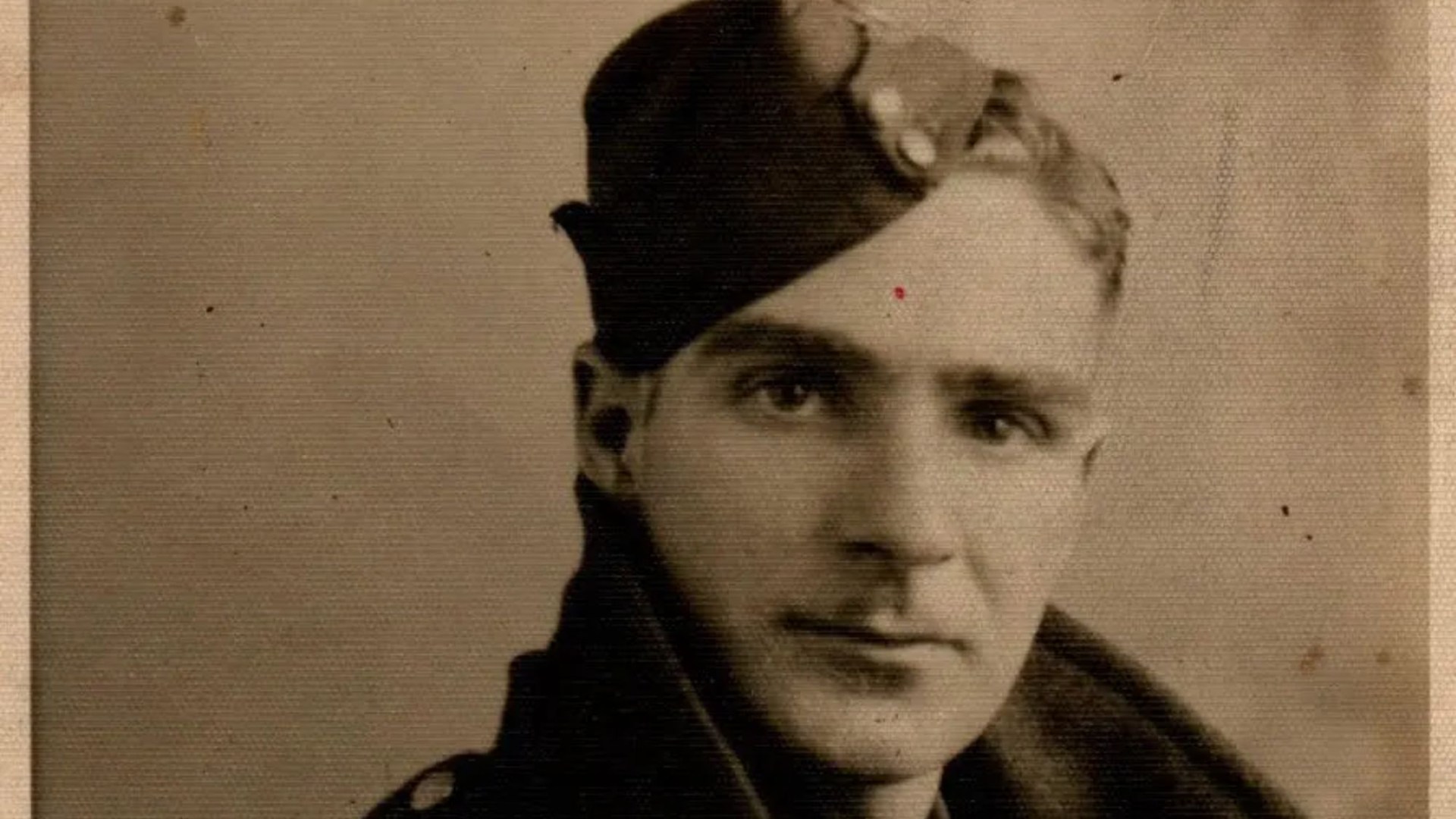WHEN Army despatch rider Herbert Kenny heard a tip about an apparent wartime “death camp” at Belsen, Germany, he had no idea he was involved in anything significant.
But as he pushed open the non-descript gates at the camp on April 15, 1945, he was about to suffer one of the greatest shocks of anyone who had ever lived.
9

9

9

9
Tasked with investigating the site in advance of a small platoon, Herbert became the first British soldier to witness the horrors of the Nazi concentration camp — a trauma he later hid from his family for 40 years.
Now, in a new book, his incredible tale can finally be shared with the world for the first time, after he opened up to journalist Mark Hodkinson.
“People were walking around with a glazed, empty look in their eyes, so terribly thin that they looked like skeletons, and some simply dropped dead right in front of me,” Herbert said.
“I saw thousands in such a terrible state.
“They were just skin and bone, not an ounce of flesh anywhere. Terrible to see.
“I saw a grave the size of a football pitch, stacked with emaciated bodies, 8ft high. What sort of fiends could do this?”
That was the sight that greeted Herbert as he strode through the gates at Belsen with only his Sten machine gun to protect him — one British soldier against dozens of SS guards at the camp.
But Herbert, who had only heard about the site by chance after chatting to a French civilian, soon had the back-up of his small platoon — and the Brits found the Germans ready to surrender.
He said: “The inmates were not all Jews, as we are often led to believe.
‘Doubled up in pain’
“There were also Polish, German, French, Danes and many others. We rounded up the SS guards and placed them under armed surveillance. I had to take a grip of myself to prevent me going berserk with my Sten as I faced them.”
Although the Frenchman he met had told him there were rumoured to be “many killings, shootings and the prisoners were starving”, there was no way Herbert could have prepared himself for the horrors he encountered.
He said: “I saw them shuffling along without hardly any energy in their bodies to move. That alone was a terrible sight, but there was worse than these poor bodies. They were just skin and bone.
“It made me wonder how the bones were left together. What had been muscle and tissue was faded. Ligaments like string, so terribly thin, with no flesh to give bulk for support.
“Just as bad was the look on their faces, a look of despair and hopelessness, waiting for the end.”
He added: “This wasn’t war. This was a nightmare. The gruesome sights and the smell.”
Herbert and two other motorbike riders were told to tour the camp then report back on what they found.
Immediately they recognised the brutality and cruelty that had been perpetrated by the Nazis, but the full scale of the atrocity — 60,000 “skeletons” and 13,000 unburied corpses — would only be confirmed later.
Herbert said: “It must be remembered that the war was not yet over. The advancing Allied troops had to be kept supplied.
This wasn’t war. This was a nightmare. The gruesome sights and the smell
Herbert Kenny
“And here at this terrible place, quite a number had been diverted from carrying out their normal duties to deal with something beyond anything they had been trained for.”
Herbert tried to give some prisoners chocolate but instantly regretted it as they doubled up in pain.
“Their stomachs couldn’t take anything,” he recalled. “The best we could do was make a thin stew.”
Although top brass back home had known about the existence of concentration camps for years, the rank and file troops had no idea such places existed.
Herbert had to ride 50 miles to alert HQ of Belsen’s existence.

9

9
Despite British efforts to save the starving prisoners — many suffering from typhus and, dysentery — 9,000 died in the two weeks after Herbert’s arrival.
Anne Frank had been held in Belsen but died six weeks before it was liberated.
British soldiers had been instructed to spare the German guards but when the prisoners begged to carry out revenge on one guard, they relented.
Herbert says: “These skeletons who had been struggling to even walk, suddenly found a great energy as they set about him. They ripped him to pieces.”
The effects of what Herbert witnessed took its toll and in September 1945 he fell ill and was hospitalised, his body shutting down from the trauma.
He was finally discharged, unfit for service.
Back home in Middleton, Gtr Manchester, apart from speaking to his wife Grace a little about his ordeal, he told no one what he had witnessed and tried to go back to work but could not complete a full week’s worth.
He never had counselling or sought medical help for his trauma.
But, he says, he was a “broken man” and would sometimes cry all day.
Herbert was born in 1912 and was only two when his father left to fight in World War One. Although his father survived the Battle of the Somme, he was killed two years later in northern France, just five months before the end of the war.
When World War Two broke out, Herbert was initially exempt from service because mechanics were considered vital to the war effort at home.
But at 27 he signed up and though he showed skills with a gun, he became a despatch rider selected for special missions to deliver messages along the front line.
After the war, he and his wife went on to have five children and 23 grandchildren.
The first British soldier to enter the Belsen Concentration Camp will never forget what he saw and the feeling of horror he had and the horror of man’s inhumanity to man
German Chancellor Helmut Kohl
At one stage they emigrated to Australia as “Ten Pound Poms” but the death of a grandchild prompted them to return to England.
Herbert was never happy back in Britain though. He was only moved to tell his story in 1985 after reading about an event to mark the 40th anniversary of VE Day.
‘Right man for the job’
A few weeks earlier, German Chancellor Helmut Kohl had visited Belsen, the liberation of which predated the end of the war by three weeks.
In a speech, Kohl accepted responsibility for the “crimes of the Nazi tyranny” and added: “The first British soldier to enter the Belsen Concentration Camp will never forget what he saw and the feeling of horror he had and the horror of man’s inhumanity to man.”
Mark Hodkinson, at the time a trainee reporter with the Middleton Guardian, writes: “Unknown to any of us reporters, details of a remarkable link to this global story lay just a few yards from where we were sitting.”
An envelope had been handed into the paper containing a typed article entitled “The entry of the first British soldier into Belsen” and quoting Kohl’s words.
Mark says: “I quickly realised that the article in the envelope was written by the very soldier to whom Kohl had referred.”
Herbert’s account only made a small story in the newspaper but Mark never forgot their encounter and, decades later, he decided to fully research his incredible story.

9
Mark writes: “When we met in May 1985, it was as if I had made a pact: I would finish the job he had started when making those notes.”
Thanks to the co-operation of Herbert’s family — and from access to the former soldier’s diaries — Mark pieced together Herbert’s remarkable story.
He discovered that in 1985 the squaddie had travelled to London — a trip he kept secret from his family — to attend a Belsen reunion at West Hampstead, where he met two female survivors.
Herbert wrote: “They too will never forget. They looked quite well when I met them again — such a difference to when I saw them as young girls in Belsen.
“They, of course, would not remember me, but it was so nice to know that they — together with all other survivors — were saved. If I had not found the place when I did, I don’t know if they would have been found in time to survive.
“I have often said in my prayers, ‘Thank you, Lord, for guiding me to them’.
I’d rather my father hadn’t been the one who discovered Belsen, but in all honesty he was the right man for the job
Herbert Jnr
“I feel content that I may have been chosen at that time to come into contact and be there at the right time when I met that Frenchman.
“The sight of people dying nearly at your feet, when you cannot help them or save them at that moment because they are too far gone, was very upsetting.
“Every last one of them was cruelly treated. I try not to think or remember what I saw in that terrible camp, but it is no use. I cannot close it from my mind. Forty years have passed, but the picture is still there.”
Herbert died in 2001 aged 88 from a heart attack.
The vicar at his funeral never mentioned his role in liberating Belsen because no one told him.
His son Herbert Jnr said: “I’d rather my father hadn’t been the one who discovered Belsen, but in all honesty he was the right man for the job.
“A lot of others wouldn’t have been able to cope with it.”

9

9




